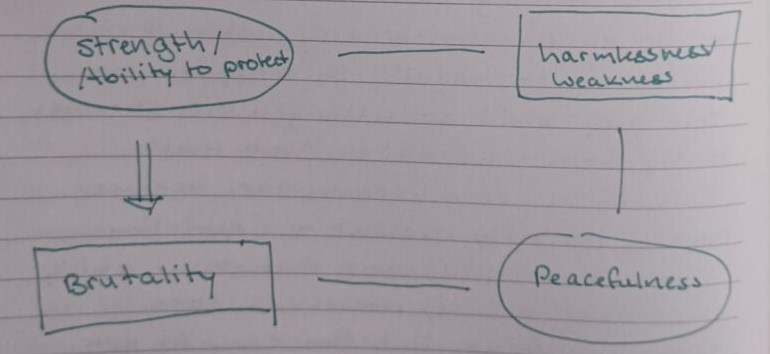Perfect Peacefulness
My daughter helped me solve a puzzle about peace.
Quotes below are excerpts from her journal she sent me.
In my Classical Civilization class we spent a lot of time talking about what violence does to us psychologically/when it invests us so heavily in a story. One guy said something I thought was really cool – he said that that’s something we’re drawn too because God is perfectly violent – (sometimes death is merciful) and that same ability to conquer/defend/protect is sooo appealing to us, but easy to get wrong.
Then a ton of girls raised their hands and just tore into this guy. “God isn’t violent. He’s the opposite. He is loving and kind and anything violent ever comes from the devil” etc. [No wonder guys today are emasculated. God is being emasculated.]
Its true that too many people start from a place of fear and therefore try to emasculate. It wasn’t men first and now God thought. It was the other way around. Nietzsche said “God is dead” for that reason. Look at the androgyne figure of Mercy in A Canticle for Liebowitz. God wants me to be happy. Therefore He wants me to feel safe. If God could threaten other people, he could threaten me; I would not feel safe. Therefore God is universally harmless. I fear violence, therefore violence is bad, therefore God is not violent.
Whereas the fear of the Lord is the beginning of wisdom. I am sure that you do not experience God’s love sufficiently if you do not fear Him. Fearing Him is not the stopping point, sure; it is a necessary part of the way.
Identifying God as “perfectly violent” is interesting. Certainly we would say “perfectly capable of violence.” This is one meaning of omnipotent. That is different from attributing all deaths to Him. Sometimes the scriptures do. The Angel of Death is God’s angel. But sometimes the scriptures assign death to the Fall, which would seem to mean that its proximately the devil or entropy or some combination thereof.
Peacefulness is restrained power. The capacity for violence but contained, while harmlessness is a lack of ability. God is not harmless. Reminded me of the Aslan/safe quote from Narnia – God is not safe. But He is good.
This was the real insight for me. Peacefulness is restrained power. There is the false kind of peace where everything has been destroyed. “They make a desert and call it peace.” I always assumed the opposite of that destructive peace was peace that was productive and abundant. Yes, but its more. True peace is productive and abundant and full of power. Its the power, the ability to not be peaceful, that makes it productive and abundant. A nuclear wasteland is not peace. Two mighty nations respecting and trading with each other is peace. A husband or wife emasculated or browbeaten into keeping their mouth shut is not peace. Strong, bold spouses living in love with each other is peace. There is a sense in which the peace of the wasteland was what Satan offered in the council.
Peace, they say, is a sign of the Spirit. Why is peace the only emotion the devil cannot counterfeit? Is it impossible for him to radiate power but also restraint at the same time?
Now that I’m looking into it I think it’s a Jordan Peterson quote
A harmless man is not a good man. A good man is a very dangerous man who has that under voluntary control
-Also it seemed like one of those virtue charts

Talkingbuffalo
September 16, 2023
I wonder what the response these girls would give in regards to the instruction Nephi received to kill Laban— the thought occurred that perhaps the reply may be that he was told to “kill him with kindness”, and that thought amused me.
On a more serious note, I think that what the boy and the girls are arguing are essentially the same thing, or, rather, aspects of the same thing—I can’t quite articulate it. Perhaps, it’s something like this (which echos your JP quote): you can’t truly be kind if you are powerless and, thus, incapable of the opposite.
John Mansfield
September 20, 2023
This brings to mind Kenneth Branagh’s recent movie “Belfast.” I recommend it with the caveat that there are a couple uses of vulgar language. It is a rather personal, sentimental remembrance of the writer/director’s childhood in 1969.
What comes to mind now is the depiction of a couple, both strong people, and yet overwhelmed by the turmoil of their time. “Strong, bold spouses living in love with each other” struggling to find their path to peace. There are a couple of scenes of the couple arguing about the course ahead, each with important valid points, and the viewer is rooting for team “them” that will prevail together.
I really liked their dance at the end.